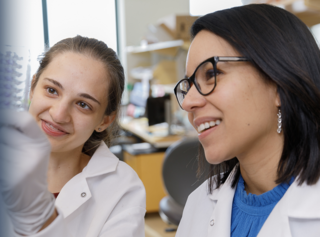Lilian Kabeche recognized for excellence in research by an Historically Excluded Person

Lilian Kabeche has been recognized for her excellence in research by the American Society for Cell Biology (ASCB.) The award is presented to early-career scientists who self-identify as Historically Excluded Persons.
Kabeche is Assistant Professor of Molecular Biophysics and Biochemistry and conducts her research at the Yale Cancer Biology Institute at the University’s West campus.
Born in Caracas, Venezuela, Kabeche immigrated to the US age 6. She studied Microbiology and Immunology at the University of Miami, where she “fell in love with cells” as a first-year graduate student.
“Ever since then, I have been fascinated in understanding how cells faithfully segregate their chromosomes,” she said.
Kabeche received a Ph.D. in Biochemistry at Dartmouth College and completed postdoctoral training at Massachusetts General Hospital/Harvard Medical School.
At Yale, the Kabeche Lab investigates how the DNA damage response pathway promotes faithful chromosome segregation. Probing these questions has led to the discovery of novel functions for major DNA damage response ‘kinases’ – the vital proteins responsible for signaling in our cells, and which contribute to all stages of cancer development.
The award for excellence in research is presented to early or mid-career scholars who self-identify as Historically Excluded Persons. Recipients are recognized as having developed strong independent research programs with the potential for a high level of scientific endeavor and leadership.
“I am extremely excited and honored to receive this prestigious award from the ASCB,” said Kabeche. “The Association has played a major part in my scientific journey, and some of my most vibrant memories as a scientist are from our meetings.”
Joining the Yale faculty in 2019, Kabeche set to creating a safe lab space for a diverse set of individuals whose research, education, and life experiences are vastly different – mentorship responsibilities that she takes “incredibly seriously.”
More widely at Yale, Kabeche continues to tackle inclusivity in the classroom by redesigned primary biochemistry courses and lectures to highlight prominent women scientists and scientists from underrepresented backgrounds. She also co-organizes expanded mentoring for first-year, underrepresented women graduate students and plans to widen support from faculty mentor groups in future.
“I am very grateful to the members of my lab, my amazing group of colleagues who have helped me create an enriching scientific environment at Yale, and the incredible mentors who have supported and continue to support me in my career.”
The American Society for Cell Biology is an inclusive, international community of scientists in cell biology and biomedical research dedicated to advancing scientific discovery, advocating sound research policies, improving education, promoting professional development, and increasing diversity in the scientific workforce.